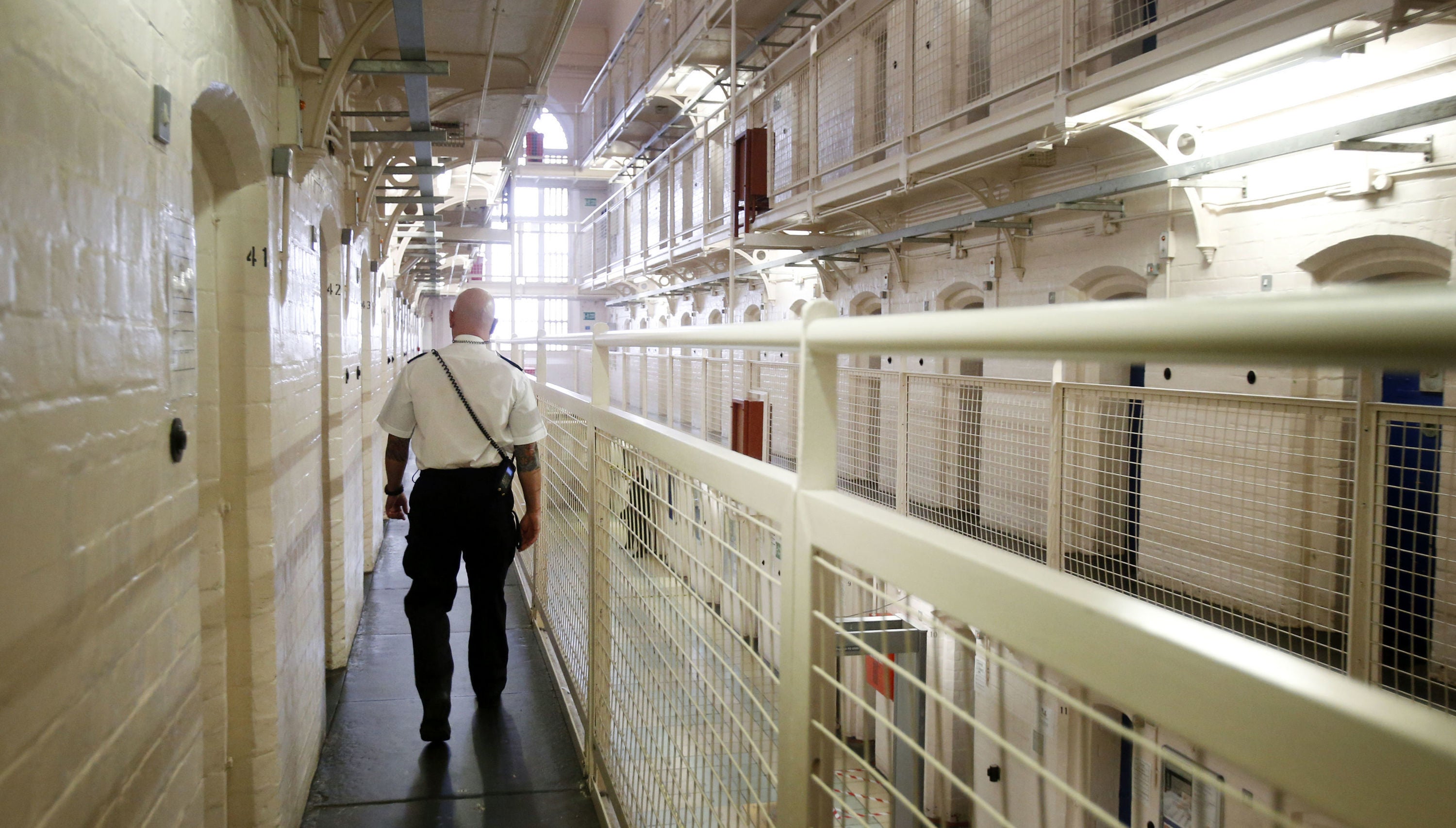Chief prisons inspector: Overcrowding is a ticking time bomb
Exclusive: Last-ditch government plans to free up cells not enough to prevent overcrowding problem from ‘blowing up’, prisons watchdog warns
Your support helps us to tell the story
From reproductive rights to climate change to Big Tech, The Independent is on the ground when the story is developing. Whether it's investigating the financials of Elon Musk's pro-Trump PAC or producing our latest documentary, 'The A Word', which shines a light on the American women fighting for reproductive rights, we know how important it is to parse out the facts from the messaging.
At such a critical moment in US history, we need reporters on the ground. Your donation allows us to keep sending journalists to speak to both sides of the story.
The Independent is trusted by Americans across the entire political spectrum. And unlike many other quality news outlets, we choose not to lock Americans out of our reporting and analysis with paywalls. We believe quality journalism should be available to everyone, paid for by those who can afford it.
Your support makes all the difference.The UK must decide what the point of jail is, the chief inspector of prisons has warned, as he suggests they are a poor use of taxpayers’ money with criminals becoming more dangerous while inside.
Charlie Taylor said it is “almost inevitable” that whoever wins the next general election will be forced to confront the question of what prisons should be for, warning that merely locking people up in “revolting” conditions for ever-longer periods risks creating more victims of crime, not fewer.
Mr Taylor also issued a stark warning over the government’s last-ditch efforts to free up space in prisons. He said that overcrowding is a “ticking time bomb” and that plans to release inmates early and spare some offenders jail will not be enough to prevent the issue from “blowing up”.
It comes after a tumultuous year in which the escape of Daniel Khalife served to intensify the spotlight on the crisis unfolding behind bars as prisons ran out of space – with ministers forced to release inmates early for the first time in 15 years.
In an interview with The Independent, His Majesty’s chief inspector also warned that:
- Prison inspectors have issued a record five emergency warnings to the justice secretary this year
- Conditions inside prisons are “simply unacceptable”, with officers wading through open sewage in HMP Bedford
- Drugs are “pouring” into prisons, fuelling violence as inmates become addicted behind bars
- Longer sentences are driving overcrowding and harming rehabilitation
Pointing to the current state of a number of prisons, Mr Taylor said it would be “incredibly surprising” if people were not more likely to reoffend after being in jail, given that many inmates are locked in “incredibly squalid” cells for 23 hours a day, some developing drug habits, and lack access to rehabilitation support.
“At a cost of £50,000 a year to keep someone locked up, it doesn’t feel like a great use of taxpayers’ money,” he said, adding: “We should be having prisons that create fewer victims, not that are going to end up creating more victims.”

“Ultimately, as a country, we need to decide on who we want to lock up, how long we want to lock people up for, and what we actually want to happen to them,” he said.
“If we simply want to lock people up, throw away the key, and keep them in revolting conditions, well, that’s fine. But the danger, then, is that when these people come out of prison, they will be far worse than when they went in, they’ll cause more mayhem in communities, and they’ll create more victims of crime.”
Sentence lengths have increased by a third in the space of a decade, in line with the “tough on crime” rhetoric espoused by successive governments, and Mr Taylor warned that this was fuelling overcrowding, with a knock-on effect on rehabilitation.
This is further exacerbated by the record-high backlog of cases in the courts, which has seen more people than ever trapped behind bars while awaiting trial.
Against this backdrop, suicide and serious violence soared by nearly a quarter in men’s jails in the last year, while in the women’s estate, assaults on staff hit an all-time high and self-harm soared by 63 per cent – a cocktail Mr Taylor previously said was symptomatic of a system “under enormous strain”.
The chief inspector said it was “absolutely unprecedented” that he had been forced to issue a record five “urgent notifications” in the past year – a protocol deployed “very sparingly” for prisons in a “really terrible state”, which gives the justice secretary 28 days to respond with an emergency plan of action.

It is “particularly concerning” that three of those jails were being put into emergency measures for the second time, with each of the three having a very high churn of remand prisoners who are often homeless, battling addiction or facing mental health difficulties, he said.
While these “particularly fragile” prisons can “just about cling on” with strong leadership, “we find things unravelling very quickly” as soon as there is a change in governor, Mr Taylor said.
The ingress of drugs “bedded into this already very volatile situation just adds to risk that these prisons face”, he said, warning of a “perfect storm” of predatory drug-dealing gangs in a captive and vulnerable market.
Pointing to HMP Woodhill, where 38 per cent of prisoners tested positive for an illegal substance, he added: “When you’ve got drugs that pervasive in a prison, what that means is [that] drugs equal debt, and debt equals violence. Drug debts get enforced by violence.”
In HMP Lindholme, more than a fifth of inmates said they had developed a drug habit while in prison. “You potentially come out with a bigger problem than you went in with, and that inevitably affects your ability to get work and pulls you further into the world of crime. So that’s an enormous concern for us.”

In October, justice secretary Alex Chalk announced an emergency plan to free prisoners early and asked judges not to jail offenders who were given sentences of less than a year – but the chief inspector fears that the government will have to go further still.
“Even with those measures in place, it still looks as if the number of places available won’t be able to keep pace with the number of prisoners coming in,” Mr Taylor warned.
“Ministers will have to then make decisions about what they’re going to do – about whether they want to introduce more early release, or can manage to squeeze out more prison places.”
Prisoners are already increasingly forced to double up in cells “designed by the Victorians for one person”, Mr Taylor warned. Analysis by The Independent in October revealed that 78 out of 124 jails in England and Wales had a population greater than the number they were supposed to hold.
Meanwhile, the Ministry of Justice has paused all “non-critical maintenance work” – despite the harrowing state of many prisons.
Mr Taylor highlighted a recent visit to Bedford, where prison officers working in an underground isolation unit housing prisoners who are often “incredibly mentally unwell and should be in hospital” were forced to wade through raw sewage in wellington boots every time heavy rain overloaded the faulty pipes.
In the same prison, he recalled being “completely overwhelmed” by the smell of black mould as he visited a three-man cell whose inhabitants were self-isolating for 23 hours a day for fear of violence, while the lack of toilets in some prisons means that inmates are forced to defecate in buckets and throw their waste out of windows, visibly staining the prison walls outside.
And in another cell, inspectors encountered a prisoner at risk of self-harm who had been left in a cell with jagged broken glass in his window, Mr Taylor said, adding: “That shows a level of neglect that is just enormously concerning. It’s not acceptable.”

Despite there being a new prison set to come into use near York, and another near Leicester already filling up, Mr Taylor warned that even the lower range of population projections “still puts prisons into the red fairly quickly” – which may force ministers to have a wider conversation about their approach to criminal justice.
“We report on what we see – and what we see at the moment is a system that is full,” he said.
“There’s going to be an election probably in the next year, so whoever the new government is has an opportunity to come in and do some thinking about prisons, and answer some of those questions about what prisons are for.
“And the population pressures are going to mean that’s almost inevitable that some version of that conversation needs to take place – because pressures on the population are just going to go up.”
A Ministry of Justice spokesperson said: “Public protection is our priority, which is why we’re keeping the most dangerous offenders behind bars for longer while reforming short sentences and getting more prisoners into work to help break the cycle of reoffending and see fewer people become victims.
“We’re also creating an additional 20,000 modern prison places – the biggest prison expansion programme since the Victorian era – with over a quarter already built, helping to rehabilitate offenders and keep our streets safe.”

Join our commenting forum
Join thought-provoking conversations, follow other Independent readers and see their replies
Comments